

This week The English Apple Man is in the Benelux region attending The Under 40's Conference with more than 50 aspirational young growers, scientists and technicians.
Wednesday morning and it was up 'before' the Lark and on the road at 5am. The Coach taking us to Holland and Belgium left Brogdale Farm near Faversham at 6.30am bound for the Channel Tunnel.
The English Apple Man will report on the Benelux visit in next week's Journal.
CANKER
Canker - Canker, caused by the fungus Neonectria ditissima is one of the most serious 'cultural' challenges faced by apple and pear growers; while Canker has always been a threat, the newer varieties embraced by top fruit growers - Gala, Braeburn, Jazz, Cameo, Kanzi, Rubens, Zari........... all have a propensity to suffer from canker.
The impact on the most vulnerable varieties; Kanzi and Rubens (both superb eating apples) has resulted in many orchards of both varieties being grubbed as a lost cause!
At a recent BEST Discussion Group meeting, Dr. Angela Berrie - Research Leader & Plant Pathologist @ East Malling Research, brought members up to date with the history and research into Canker.
Angela is Project Leader for HDC - TF 216 - Evaluation of products for control of Nectria galligena on apples.
HDC - Horticultural Development Company
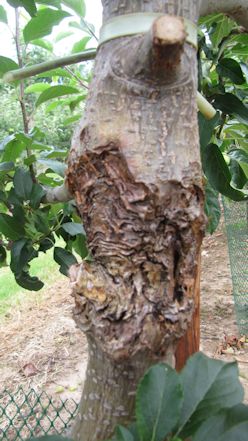 Angela highlighted the influence of rain on the spread of Canker; something we are always going to be at risk of. In fact 'wet Autumns' when leaves are falling, leaving 'leaf scars' vulnerable to infection precede the worst outbreaks of Canker. However Canker is always a risk and at anytime of the year trees are at risk of new infections. Dry weather (more likely in Summer) will reduce the risk. Symptoms will be found in mature orchards and trunk cankers on young trees in the summer months; damage to young trees will usually result in the removal of the tree. Angela pointed out that with new orchards costing in the region £21,000 and tree losses of 10% reported, the annual bill for replacement can easily exceed £2,100.
Angela highlighted the influence of rain on the spread of Canker; something we are always going to be at risk of. In fact 'wet Autumns' when leaves are falling, leaving 'leaf scars' vulnerable to infection precede the worst outbreaks of Canker. However Canker is always a risk and at anytime of the year trees are at risk of new infections. Dry weather (more likely in Summer) will reduce the risk. Symptoms will be found in mature orchards and trunk cankers on young trees in the summer months; damage to young trees will usually result in the removal of the tree. Angela pointed out that with new orchards costing in the region £21,000 and tree losses of 10% reported, the annual bill for replacement can easily exceed £2,100.
Angela said with the ongoing loss of crop protection products, the challenge facing growers is increasing; products which in the past proved effective against Canker are no longer available. It is hoped that HDC LINK Projects looking for new environmentally acceptable protectants might produce something with the ability to contain Canker.
The Defra Horticulture LINK project (known as SCEPTRE) is assessing and developing new active ingredients, biopesticides, IPM programmes and novel technologies for sustainable pest, disease and weed control in a range of edible crops. In tree fruit, it is focusing initially on powdery mildew in apple and botrytis in pear.
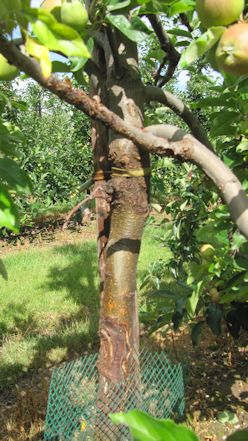 There has long been a debate about the origin of Canker in a new orchard; did it arrive from the Nursery in the trees, or did the infection originate from the orchard environment.
There has long been a debate about the origin of Canker in a new orchard; did it arrive from the Nursery in the trees, or did the infection originate from the orchard environment.
Certainly in a research project back in the late 1980's the conviction that Canker originates in the Nursery was a popular belief. Since then this theory has been discounted. That is not to say it does not infect trees in the Nursery, but the majority of infections occur from infections in the newly planted orchard.
Canker may be visible in parts of a tree, while otherwise visually uninfected wood may have a brown stain at the heart of the young branch. Various kinds of microorganisms, including actinomycetes, fungi, and other bacteria, have been found inside plants and designated as endophytes. The popular belief among 'pruners' that Canker moves from A - B in the sap stream, has not been proven; e.g. canker in the stained area has not been identified.
Speculation on the future possibility of breeding root-stocks and varieties with a resistance to Canker brought much debate; the use of GMO would make this a much easier 'nut to crack' but with the current dislike of GMO by many consumers, particularly pressure groups,it is not possible 'if or until' society in general accepts the need for genetic engineering.
In the meantime our scientists beaver away, using genetic markers (this is NOT GMO) banking on hard work and a bit of luck to stumble across a root-stock / variety with resistance to Canker and the organoleptic qualities necessary for a successful commercial apple.
The English Apple season is approaching the later stages!
![]() The 2004/15 UK season is now reaching the later stages; Cox is less available, as some suppliers begin to run out and the higher wholesale prices for Cox reflect that position. Gone are the days when marketeers ensured Cox ran until the new season Cox arrived from New Zealand. In those days, that continuity of Cox was still very important. Today Gala and Breaburn are the 'volume apples' dominating the marketplace.
The 2004/15 UK season is now reaching the later stages; Cox is less available, as some suppliers begin to run out and the higher wholesale prices for Cox reflect that position. Gone are the days when marketeers ensured Cox ran until the new season Cox arrived from New Zealand. In those days, that continuity of Cox was still very important. Today Gala and Breaburn are the 'volume apples' dominating the marketplace.
Visiting UK Supermarkets over the last 10 days, The English Apple Man has found a varying commitment to stocking 'home grown' apples. Sainsburys have shown support throughout the season with a wide range of English apples prominently displayed. To be fair having not visited Tesco recently an up to date observation cannot be made, however earlier visits demonstrated strong support for English Apples & Pears.
Both Waitrose and M&S are still displaying a good selection of 'high quality' English apples; visits to LIDL and ALDI show a contrasting picture. While LIDL show strong support for UK meat products in particular, their commitment to English apples is minimal. Cox has been an ever present and some Gala too, but throughout the season imported apples and pears have dominated the display.
ALDI is quite the opposite with a good selection of English Apples & Pears.
Below left: Jazz is always a good eat - Below right: Winter Wonder from Suffolk - the rustic quality is reminiscent of old English varieties
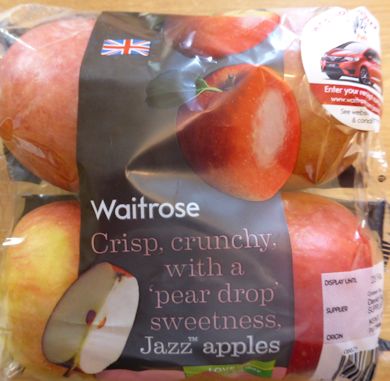
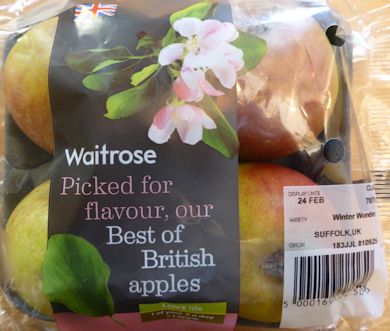
Below left: Egremont Russet sold under the Waitrose Essentials Brand - Below right: Dutch Sweet Sensation (a coloured Comice) a sign of English pears coming to an end?
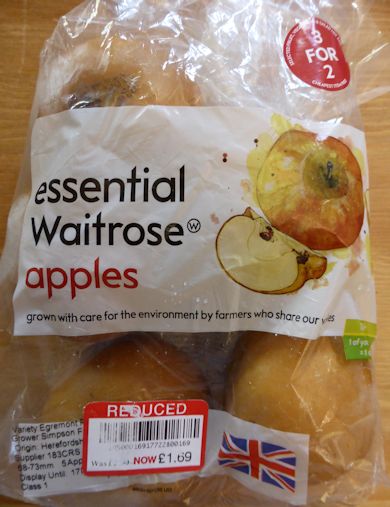
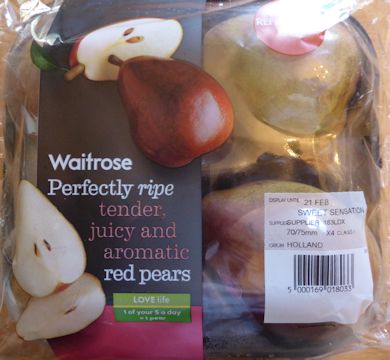
As The English Apple Man is in The Benelux region, not returning home until Saturday evening, this week's Journal is going on-line late on Tuesday evening!
Take care
The English Apple Man